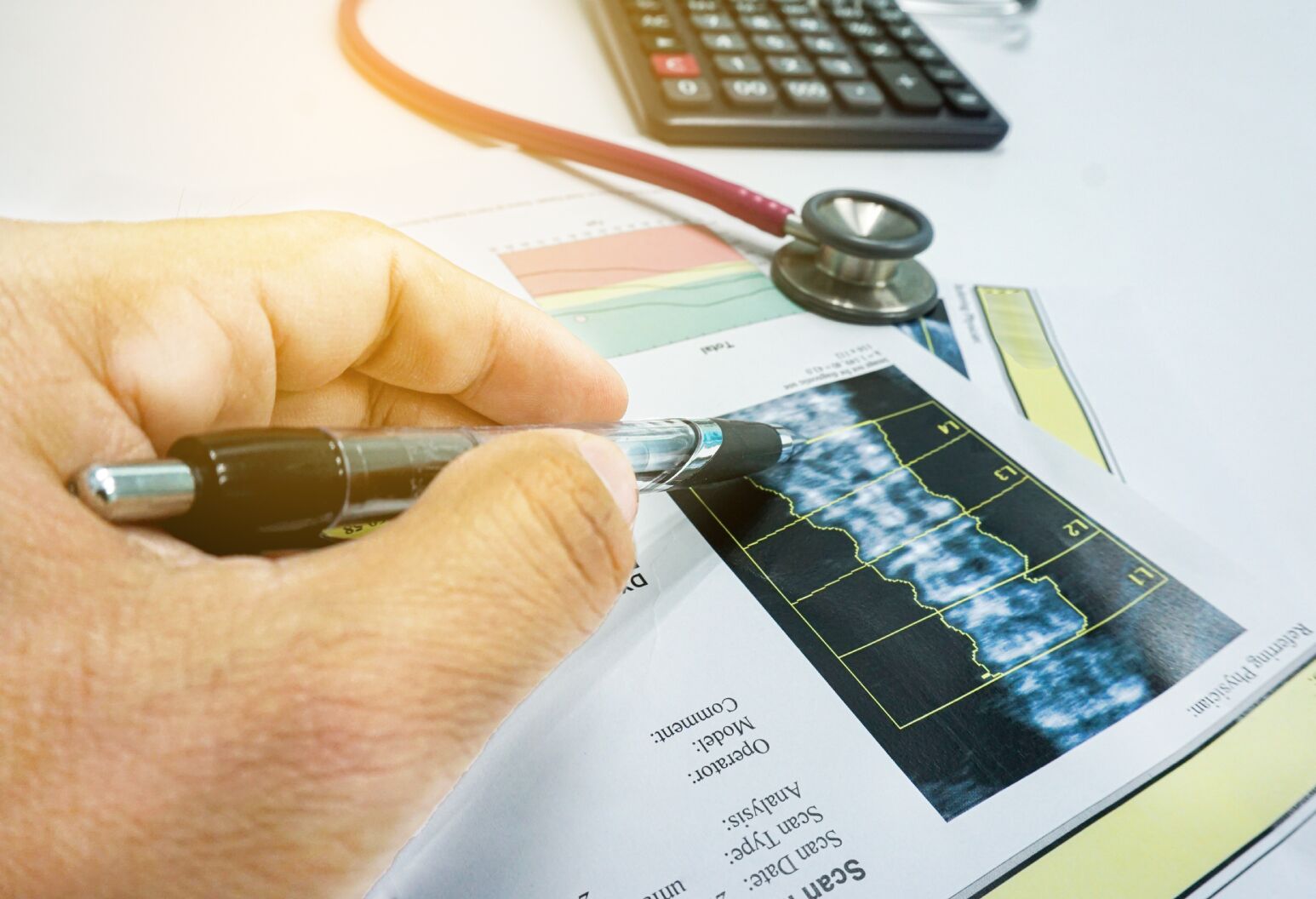DEXA scan (bone density test)
What is a DEXA scan (bone density test)?
A dual-energy X-ray absorptiometry (DEXA) scan, also called bone densitometry or a bone density test, is the most common test used to measure bone density. It’s used to diagnose osteoporosis, a condition in which bones become weak and brittle and can easily be broken by a bump or minor fall. It can also be used to monitor the progress of treatment for osteoporosis and similar conditions.
This test is a specialized kind of X-ray exam. Although the technology is sophisticated, the test itself is simple: You’ll lie on a table and a scanner will pass over your body, sending X-ray beams through specific bones—generally, those in your lower spine and hips—to measure the amount of calcium and other minerals they contain. A bone density test takes only a few minutes and involves relatively low levels of radiation—only about a tenth of a standard chest X-ray.
Why it's done
A bone density test is most often used to diagnose osteoporosis, a condition that causes bones to become thinner, more fragile and more likely to break. It can also be used to monitor treatment for osteoporosis and other conditions that affect bone density, and to evaluate a patient’s risk of experiencing a fracture.
A DEXA scan is strongly recommended if you:
- Are a post-menopausal woman and not taking estrogen
- Have a personal or maternal history of hip fracture or smoking
- Are a post-menopausal woman who is tall (over 5 feet 7 inches) or thin (less than 125 pounds)
- Are a man with clinical conditions associated with bone loss
- Use medications that are known to cause bone loss, including corticosteroids such as Prednisone, various anti-seizure medications such as Dilantin and certain barbiturates, or high-dose thyroid replacement drugs
- Have type 1 (formerly called juvenile or insulin-dependent) diabetes, liver disease, kidney disease or a family history of osteoporosis
- Have high bone turnover, which shows up in the form of excessive collagen in urine samples
- Have a thyroid condition, such as hyperthyroidism
- Have a parathyroid condition, such as hyperparathyroidism
- Have experienced a fracture after only mild trauma
- Have had X-ray evidence of vertebral fracture or other signs of osteoporosis
The Lateral Vertebral Assessment (LVA), a low-dose X-ray examination of the spine to screen for vertebral fractures that is performed on the DEXA scan machine, may be recommended for older patients, especially if you:
- Have lost more than an inch of height
- Have unexplained back pain
- Have had a bone density test that gave borderline readings
Our approach
When it comes to a bone density test, the radiologists at Northwell Health Imaging are the power behind the exam. Every DEXA scan is performed with state-of-the-art technology and interpreted by a fellowship-trained radiologist whose diagnostic skills have been honed by specialized training and thousands of hours of experience. If you need additional care, your radiologist will work side by side with the rest of your care team, collaborating closely to help guide your care.
Northwell Health Imaging offers the largest group of fellowship-trained and subspecialized radiologists on Long Island, as well as access to all the resources and clinical expertise of New York state’s largest health system. Whether you are here for screening, diagnostic or treatment imaging services, each of our practitioners is committed to providing a caring, comfortable environment and a positive, productive experience.
How to prepare
Very little preparation is required for a DEXA scan. If you use calcium supplements, stop taking them at least 24 hours before your appointment. Wear loose, comfortable clothing, and avoid items with metal zippers, snaps, belts or buttons, since metal can interfere with the imaging. You’ll be asked to remove keys or wallets from your pockets, along with jewelry and any metal objects. Let your doctor know if you’ve recently had a barium exam (another kind of X-ray procedure), or if you’ve had contrast material injected for a CT scan or nuclear medicine test. These materials can interfere with the accuracy of your test. As with any X-ray exam, you should also let your doctor and X-ray technologist if there’s a possibility that you’re pregnant. Radiation can be harmful to a fetus, so many imaging tests are not performed during pregnancy. If an X-ray exam is necessary, precautions will be taken to minimize radiation exposure to the fetus.
Results
Bone density test results come in the form of two scores: a T score and a Z score. The T score is a measure of your bone density compared to the peak bone mass reading of a young adult of your gender. It is used to flag possible osteoporosis or osteopenia (a condition in which bone density is lower than normal, and possibly a precursor to osteoporosis). The Z score is a measure of your bone mass compared to what’s expected for a person of your age, sex, weight and ethnic or racial origin. A low Z score may suggest that something other than age is affecting your bone density.
Your DEXA scan will be read/interpreted by a subspecialized radiologist and the results will be promptly shared with your physician. Your doctor will determine if any follow up care is needed.

